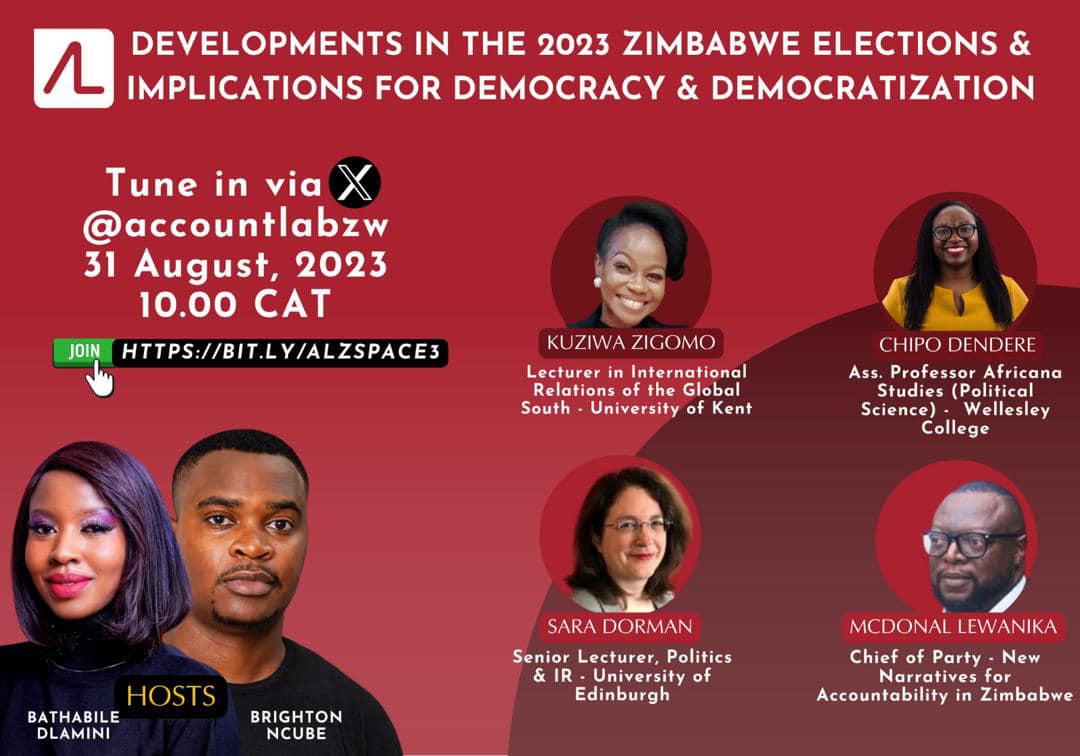NEWS

IN BRIEF
In the 2023 Zimbabwean elections, female political participation remained distressingly […]
SHARE
In the 2023 Zimbabwean elections, female political participation remained distressingly low, highlighting significant challenges in achieving gender balance within the political arena. Only 68 women sought direct election to the National Assembly’s 270 seats, with 23 winning. In June 2023, the Zimbabwe Electoral Commission published a presidential candidates list of eleven men amid controversy surrounding the disqualification of two female candidates, Linda Masarira of the Labour, Economists and African Democrats and Elisabeth Valerio of the United Zimbabwe Alliance. These glaring disparities raise fundamental questions about why women remain underrepresented in the country’s political landscape.
Speaking during an AL-Zimbabwe Spaces conversation on X about Developments in the 2023 Zimbabwe elections and implications for democracy and democratization, Assistant Professor for Africana Studies at Wellesley College, Dr. Chipo Dendere, observed, “$20,000 to run for office is a very easy way to limit people’s voice and to disenfranchise people from participating. The way we have to think about this is, how many hours, how many months? How hard does somebody have to work on a basic salary in Zimbabwe to be able to run for office? If the average person cannot pay these fees, then it means that the realm of politics has been left for the elites. And we already know that in our society, women tend to make less money than men tend to make.”
The Zimbabwean environment is particularly toxic for female politicians, and political discourse is characterized by ferocious attacks on female politicians, analysts, academics, and journalists. This unwelcoming atmosphere, rife with sexism and misogyny, deters women from venturing into the political sphere, fuelling a daunting and hostile landscape.
Zimbabwean society itself is deeply patriarchal, impacting both men and women. The pervasive influence of patriarchy perpetuates gender stereotypes and biases, making it challenging for female candidates to garner support for their campaigns. Further, ingrained biases shape women’s perceptions of their capabilities, undermining their confidence to engage actively in politics.
Adding complexity to the issue is the intersectionality of factors such as party affiliation, class, age, and marital status. In Zimbabwe, party loyalty often precedes gender considerations when voters choose, overshadowing the importance of promoting female candidates.
“If you noticed, in this election, a lot of those women who ran as independents in 2018 were no longer running,” said Kuziwa Zigomo, lecturer in International Relations of the Global South, University of Kent. “It’s not enough to be a woman or [to have] female voters. Most voters don’t vote for a candidate on the basis that she’s a woman. Party identification tends to trump many of these other factors,” she added.
While proportional representation (PR) has been implemented to address gender disparities in politics, it cannot stand alone. Focusing solely on gender may not effectively dismantle broader barriers, such as party affiliation, class, and age. To truly make a difference, PR must be part of a comprehensive strategy that addresses these intersecting challenges.
For democracy to thrive in Zimbabwe, institutions like the Zimbabwe Electoral Commission (ZEC) must be accountable and transparent. Timely delivery of election materials, accessible voter registration, and fair media coverage are essential to create a conducive environment for free and fair elections.
“What we need is for those institutions to be accountable and for people to expect them to function in ways that respond to the needs of the people,” said Sara Dorman, senior lecturer for Politics and International Relations at the University of Edinburgh.
The 2023 elections laid bare issues of voter apathy and made the hopelessness among the electorate visible. Many citizens have lost faith in the democratic process, presenting a significant challenge for civil society organizations striving to engage and mobilize the population. Rebuilding trust in institutions and empowering citizens to participate in politics actively are essential steps to secure the future of Zimbabwean democracy.
The 2023 Zimbabwean elections have exposed critical challenges that demand urgent attention for the advancement of democracy and democratization. These challenges encompass exorbitant nomination fees, a toxic political environment, and deeply entrenched patriarchal norms. Addressing these issues and establishing more transparent, accountable institutions is imperative to foster a thriving democracy in Zimbabwe. Citizens, civil society organizations, and political leaders need to unite and chart a path toward a more inclusive and equitable political landscape.
—
Bathabile Dlamini – Media and Communications Officer at Accountability Lab Zimbabwe
